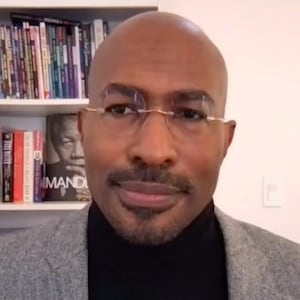If the tight blue spacesuit, the cowboy hat, and the phallic rocket didn’t garner enough attention, Jeff Bezos threw in another $200 million to make Tuesday a spectacle befitting the world’s richest man.
Still sporting his space gear, Bezos unveiled a pair of “Courage and Civility” awards, valued at $100 million apiece, which he said he would hand over to two recipients, no strings attached: “No bureaucracy. No committees. They just do what they want.”
The inaugural awardees were chef José Andrés—whose charity, World Central Kitchen, helps feed masses of people following natural disasters—and Van Jones, who has founded a number of nonprofits but is best known as a CNN political commentator.
Jones was visibly gobsmacked. “You have lifted the ceilings off of the dreams of humanity today,” he said of Bezos. Andrés said the gift would be “the start of a new chapter” for World Central Kitchen.
But the donations raised eyebrows to some in the philanthropic sector.
“Bezos is reacting and responding to the general trend towards no-strings-attached giving, exemplified by [his ex-wife] MacKenzie Scott, but it seems to be done in a kind of hasty, ad-hoc way,” says Benjamin Soskis, a senior research associate in the Center on Nonprofits and Philanthropy at the Urban Institute.
“There is a strange disconnect between the lengthy rollout and build-up to his space program… and the hasty, afterthought ways in which he’s announcing his philanthropy. That does raise concerns that it’s literally an afterthought to him as well.”
Elizabeth Dale, an associate professor of nonprofit leadership at Seattle University, also thinks Bezos is signaling that philanthropy is “not something that he really wants to involve himself in right now, and [he] would rather just award this money to others to distribute.” The strategy isn’t necessarily problematic, she adds, but “is a stark contrast from what MacKenzie Scott is doing.”
Scott has received wide praise for distributing more than $8 billion to hundreds of universities, arts programs, and nonprofits over the past two years. Her team, she says, used a “data-driven approach” to target “communities facing high projected food insecurity, high measures of racial inequity, high local poverty rates, and low access to philanthropic capital.”
Bezos seems to have preferred a meat cleaver tactic over that scalpel approach.
The Amazon founder says he selected Jones and Andrés in part for their civility. “It’s easy to be courageous but also mean,” he said. “Try being courageous and civil. Try being courageous and a unifier.” True words, but curious coming from Bezos. At Amazon, he was reportedly known to say things like, “If I hear that idea again, I’m gonna have to kill myself.”
The comments also rankled some of Bezos’ media detractors.
“It’s no accident that those with the greatest to lose from real change to the status quo favor civility,” says Anand Giridharadas, whose book Winners Take All excoriated billionaire philanthropy. “Real change involves a loss of power, and for America to progress, Jeff Bezos needs to lose power. And he will always find that uncivil. We should do it anyway.”
As for Uncle Sam, the tax implications of Bezos’ gift depend on how it is structured. (Amazon did not immediately respond to a request for comment.) If he hands off the money outright, Bezos could owe millions of dollars in gift taxes, says Harvey Dale, director of the National Center on Philanthropy and the Law. But if he instead simply sets aside $200 million and lets Andrés and Jones decide how to disburse it, he would instead earn an income tax deduction.
“I’m guessing that Bezos did not hand off those funds,” Dale said.








